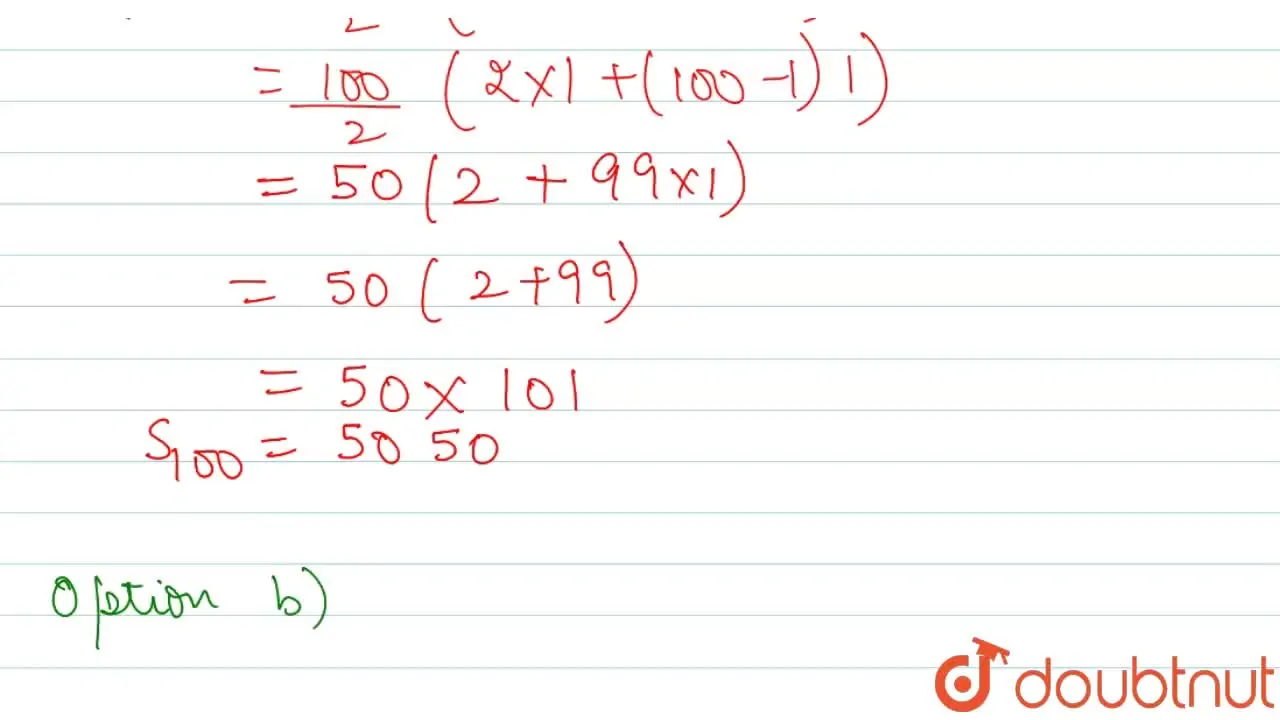1+2+3+4+…………+100=
5000
5050
5500
5555
The correct Answer is:B
Step by step video, text & image solution for 1+2+3+4+…………+100= by Maths experts to help you in doubts & scoring excellent marks in Class 10 exams.
Related Playlists
- BOOK - TARGET PUBLICATIONCHAPTER - ARITHMETIC PROGRESSION EXERCISE - Based on Practice Set 3.18videos
ARITHMETIC PROGRESSION
- BOOK - TARGET PUBLICATIONCHAPTER - ARITHMETIC PROGRESSION EXERCISE - Based on Practice Set 3.216videos
ARITHMETIC PROGRESSION
- BOOK - TARGET PUBLICATIONCHAPTER - ARITHMETIC PROGRESSION EXERCISE - PRACTICE SET 3.523videos
ARITHMETIC PROGRESSION
- BOOK - TARGET PUBLICATIONCHAPTER - BOARD QUESTION PAPER: MARCH 2019EXERCISE - (Solve the following questions (Any one):4videos
BOARD QUESTION PAPER: MARCH 2019
Similar Questions
Shaan got a total of Rs. 912 in the denomination of equal numbers of Rs. 1, Rs. 5 and Rs. 10 coins. How many coins do Shaan posses?
View SolutionKing Dashratha of Ayodhya on his birthday decided to offer 100 coins of gold among his 4 sons and 3 wives. The denomination of each coin is ₹1. He put all the 100 coins in 7 bags in such a way that by taking a proper combination of various bags any integral sum (i.e. ₹ 1, 2, 3, 4, ... .100) can be obtained and it is known that the only whole sum of any bag can be taken.
If all coins, of these who have odd number of coins, are combined then minimum how many people are required to combine their coins to make the same amount having even number of coins:View SolutionSum of the series 1+2.2+3.22+4.23+…+100.299 is
View SolutionWhat is the sum of the following series ? 11×2+12×3+13×4+………+1100×101
View SolutionFind the last digit of the expression:
12+22+32+42+……..+1002.View SolutionSam Comprehension for (Q.No.76 to Q.No.78) TTETRT Consider the algebraic expression (x 1) (x 2) (x 3) (x 4) 100) On the basis of above information, answer the following questions 76. Coefficient of x 100 is equal to 76. (1) 1 (2) 50 (3) 100 (4) 101 77. Coefficient of x 99 is equal to 17 (1) -50 (2) -100 (4) -101 (3) -5050 78. Coefficient of x is equal to 98 (1) -158975 (2) -168925 (3) -167925 (4) -157925
View SolutionFind the indicated term(s) in each of the followng A.P.'s
(i) −1,−2,−3,−4………….,t100
(ii) n−1,n−2,n−3,………….,am
(iii) a=3,d=2,a10,anView SolutionLet matrix B=[41−9−2], then which of the following will not be an element of matrix B100 300 (2) 301 (3) −299 (4) 100
View SolutionA die is rolled 600 times and the occurrence of the outcomes 1, 2, 3, 4, 5 and 6 given below :
∣∣∣Outcome 1 2 3 4 5 6Frequency 200 30 120 100 50 100∣∣∣View SolutionThe unit digit of the expression
(1!)1!+(2!)2!+(3!)3!+……+(100!)100! :View Solution


